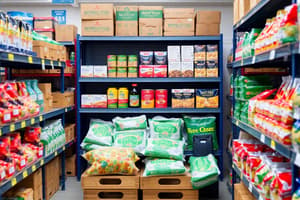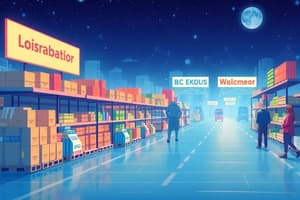Podcast
Questions and Answers
What is a characteristic of the producer to consumer distribution channel?
What is a characteristic of the producer to consumer distribution channel?
- It sells products directly without intermediaries. (correct)
- It includes multiple intermediaries.
- It is used for bulky products.
- It relies on retailers for sales.
When is the producer to wholesaler to retailer to consumer channel typically used?
When is the producer to wholesaler to retailer to consumer channel typically used?
- When products are too bulky for direct consumer sales. (correct)
- For products sold exclusively online.
- For items that require direct consumer interaction.
- For seasonal products.
What role do agents play in the distribution channel?
What role do agents play in the distribution channel?
- They buy products in bulk and sell directly to consumers.
- They manage product distribution.
- They take full ownership of products.
- They are compensated through commissions. (correct)
Which distribution channel is most likely used for selling heavy machinery?
Which distribution channel is most likely used for selling heavy machinery?
Why might a manufacturer choose to use multiple distribution channels?
Why might a manufacturer choose to use multiple distribution channels?
What is one way that wholesalers assist retailers?
What is one way that wholesalers assist retailers?
Which characteristic is common among merchant wholesalers?
Which characteristic is common among merchant wholesalers?
What is a distinguishing feature of full-service wholesalers compared to limited-service wholesalers?
What is a distinguishing feature of full-service wholesalers compared to limited-service wholesalers?
How do wholesalers assist manufacturers?
How do wholesalers assist manufacturers?
What type of full-service wholesaler deals in a wide variety of products?
What type of full-service wholesaler deals in a wide variety of products?
Flashcards are hidden until you start studying
Study Notes
Distribution Channels
- Producer to Consumer: Direct sales without intermediaries, e.g., purchasing directly from a brand’s website.
- Producer to Retailer to Consumer: Involves retailers as intermediaries for bulky products, e.g., cars and furniture, where additional handling increases costs.
- Producer to Wholesaler to Retailer to Consumer: Wholesalers sell to other businesses, e.g., for products like chewing gum, which are too many for producers to handle alone.
- Producer to Agent to Wholesaler to Retailer to Consumer: Agents facilitate sales without taking ownership; used for seasonal products and companies lacking a sales force.
- Producer to Organizational Buyer: Manufacturers' sales force sells directly to business users; common for heavy machinery and airplanes.
- Multiple Channels: Manufacturers often utilize various distribution strategies for different market segments.
Roles of Wholesalers
- Services to Retailers:
- Buy in bulk, then sell smaller quantities to retailers.
- Provide delivery and stock diverse products from multiple producers.
- Offer assistance with promotion, market information, and financial support.
- Services to Manufacturers:
- Similar support as provided to retailers.
- Maintain a sales force, reduce inventory costs, and manage credit risks.
Types of Wholesalers
- Merchant Wholesalers: Purchase large quantities to sell to other businesses, operating warehouses for storage.
- Full-service Wholesalers: Provide comprehensive functions, including general, limited, and specialty line wholesalers.
- Agents and Brokers: Agents represent buyers or sellers, typically on a commission; brokers specialize in commodities and often work temporarily.
Types of Retail Stores
- Independent Retailer: Operates one retail outlet; provides unique, personalized shopping experiences.
- Chain Retailer: Operates multiple outlets; emphasizes brand consistency across locations.
- Department Stores: Large stores with departments for various product categories, e.g., Woolworths.
- Discount Stores: Self-service outlets offering products at lower prices, e.g., The Crazy Store.
Shopping Centres
- Planned Shopping Centres: Retail facilities designed by independent owners; include several store types:
- Lifestyle Centres: Upscale stores in an open-air setting.
- Neighborhood Centres: Small convenience and specialty stores.
- Community Centres: Include department and specialty stores plus convenience shops.
- Regional Centres: Large shopping facilities with diverse offerings including department stores and restaurants.
Physical Distribution
- Definition: Refers to all activities necessary for moving products from producers to users.
- Key Functions:
- Inventory management.
- Order processing.
- Warehousing.
- Materials handling.
- Transportation.
Inventory Management
- Focus: Balancing inventory costs, including holding costs (storage, insurance, taxes) and minimizing stockout costs which lead to lost sales.
Sales Promotion Methods
- Factors Influencing Choice: Objectives, product characteristics, target market profiles, and competitive environment.
- Common Methods:
- Rebate: Partial refund from purchase price.
- Coupon: Discounts applied at purchase.
- Sample: Free products to promote trial.
- Premium: Gifts given for product purchases.
- Frequent-user Incentive: Rewards for repeat purchases.
- Point-of-Purchase Display: In-store promotional materials.
- Trade Show: Exhibitions for many sellers to present products.
- Buying Allowance: Temporary price reductions for bulk purchasing.
- Cooperative Advertising: Manufacturer contributes to retailer's ad costs.
Studying That Suits You
Use AI to generate personalized quizzes and flashcards to suit your learning preferences.




